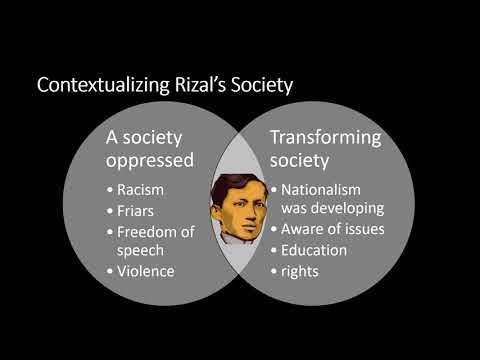Rizal and the Philippine Nationalism: bayani and kabayanihan
Summary
TLDRThis video report explores the concepts of nationalism, heroism, and the evolving definitions of 'bayani' (hero) in the Filipino context. The discussion highlights the influence of José Rizal, whose life and ideals inspired Filipino nationalism. It contrasts traditional and modern views of heroes, from those who fought for independence to today's Overseas Filipino Workers (OFWs), who are considered modern-day heroes. The report emphasizes the importance of selflessness, courage, and dedication to the greater good, encouraging viewers to embody these values in their own lives.
Takeaways
- 📚 The report covers Philippine nationalism and focuses on various aspects related to Jose Rizal and Filipino identity.
- 🌟 Rizal is admired for his philosophies, life principles, conviction, thoughts, ideals, aspirations, and dreams.
- 👨👩👧👦 As a person, Rizal valued respect for parents, love for siblings, and loyalty to friends; as a Filipino, he valued nationalism, patriotism, and heroism.
- 📖 Nationalism is defined as loyalty and devotion to a nation, emphasizing the promotion of its culture and interests over others.
- 💪 Heroes, according to Merriam-Webster, are mythological or legendary figures of divine descent with great strength or ability, admired for achievements and noble qualities.
- 🇵🇭 The Filipino term 'bayani' is similar to 'hero' but also encompasses a sense of passion for service and community cooperation.
- 📜 The UP Dictionary defines 'bayani' as a person of extraordinary courage and ability, someone willing to stand for what is right, or someone with extraordinary talent.
- 🔄 The concept of 'bayani' has evolved from being someone who fought for independence to someone who sacrifices for the benefit of others.
- 🌍 Overseas Filipino Workers (OFWs) are modern-day heroes who endure hardships and sacrifices to provide for their families and contribute significantly to the Philippine economy.
- 🎉 December is celebrated as the month of Overseas Filipino Workers, recognizing their vital contributions to the nation's economic status and stability.
Q & A
What is the main theme of the report?
-The main theme of the report is the exploration of nationalism, heroism, and the concept of 'bayani' in the context of Philippine history and culture, focusing on figures like Jose Rizal.
How is nationalism defined in the report?
-Nationalism is defined as loyalty and devotion to a nation, with a sense of national consciousness that exalts one nation above others, emphasizing the promotion of its culture and interests.
What are the key values associated with Jose Rizal according to the report?
-Jose Rizal is associated with values such as respect for parents, love for siblings, loyalty to friends, nationalism, patriotism, and heroism.
How does the report differentiate between 'hero' and 'bayani'?
-The report differentiates 'hero' as a person with great strength, admired for noble qualities and achievements, often in a legendary or mythological context, while 'bayani' in the Filipino context is seen as someone who has a passion for service, contributes to the community, and works for the greater good.
What are the different meanings of 'bayani' according to the UP Dictionary?
-According to the UP Dictionary, 'bayani' can mean a person of extraordinary courage and ability, someone who defends what is right, a person with extraordinary talent who has done something noble, or a leading figure in a play.
How has the concept of 'bayani' evolved over time?
-The concept of 'bayani' has evolved from someone who fights for the community and independence, often against colonizers, to someone who sacrifices for the benefit of others, embodying selflessness and care in modern times.
What is the significance of OFWs (Overseas Filipino Workers) in the context of modern-day heroism?
-OFWs are considered modern-day heroes (bagong bayani) because they endure hardships like loneliness and exploitation to provide for their families, contribute significantly to the Philippine economy through remittances, and help stabilize the country's financial situation.
Why does the report emphasize the importance of Rizal's influence on Filipino nationalism?
-The report emphasizes Rizal's influence because his philosophies, principles, and actions inspired Filipinos to recognize and resist the abuses and corruption they faced, igniting the desire for independence.
What is the modern-day relevance of the term 'bayani' as discussed in the report?
-The modern-day relevance of 'bayani' is that it extends beyond historical figures to include ordinary Filipinos who make sacrifices for the greater good of their community and country, illustrating that anyone can be a hero.
How does the report connect the concept of 'bayani' with the Filipino community's identity?
-The report connects 'bayani' with the Filipino community's identity by showing how the term is rooted in the collective experiences and values of Filipinos, emphasizing service, sacrifice, and dedication to the nation.
Outlines

This section is available to paid users only. Please upgrade to access this part.
Upgrade NowMindmap

This section is available to paid users only. Please upgrade to access this part.
Upgrade NowKeywords

This section is available to paid users only. Please upgrade to access this part.
Upgrade NowHighlights

This section is available to paid users only. Please upgrade to access this part.
Upgrade NowTranscripts

This section is available to paid users only. Please upgrade to access this part.
Upgrade NowBrowse More Related Video

HIS007 Session 2

Module 2 Who and What MAde Rizal Our National Hero

Rizal in the Context of 19th Century Philippines (Economic and Political Developments)

MATATAG AP7 Q3 Week 1 - Kahulugan ng Nasyonalismo, Kasarinlan at Pagkabansa with PPT and DLL

EPIC | THE LIFE OF LAM-ANG | English 7 | Poem + Vocab + Quiz | MATATAG Curriculum

MIKRO VS MAKRO | PENJELASAN MEKANIK ML
5.0 / 5 (0 votes)